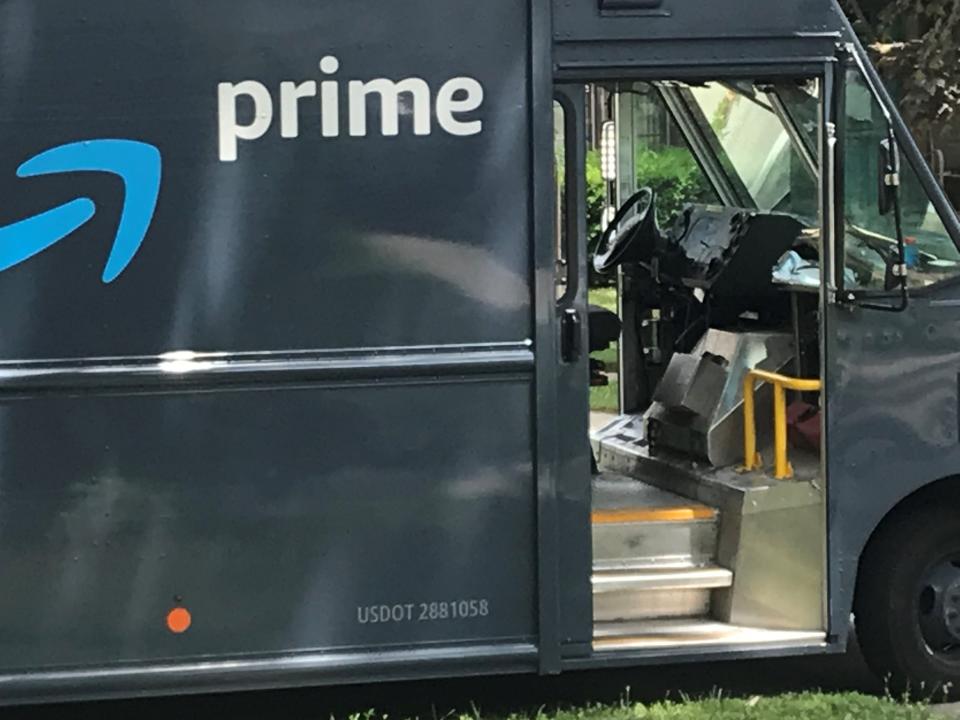Amazon scams heat up along with shopping for Prime Day deals
The Amazon shopping season — known as Amazon Prime Day — is upon us. And it's time to fend off more rounds of Amazon-related scams.
Amazon is a favorite for scammers throughout the year. Nearly one out of five people who reported a business impersonation scam said the scammer pretended to be from Amazon, according to the Federal Trade Commission's Consumer Sentinel Network data from July 2021 through June.
During the past year, 65,976 people reported being targeted by Amazon impersonators, and 5,411 people said they lost money, according to new data from the FTC.
Reported losses totaled more than $36 million, based on the FTC data. The median loss in this group — meaning half lost more and half lost less — during this time was $1,050.
It's a ton of money to lose especially as consumers cope with skyrocketing prices on everything from groceries to gas.
Amazon Prime Day runs Tuesday and Wednesday but the sales trigger plenty of online bargain hunting in July, usually a dead zone for shoppers. And you can bet the scammers will be playing the odds that they can trick online shoppers once again.
In the first few days of July, Amazon-related phishing attacks increased by as much as 37% compared with the daily average in June, according to the cybersecurity firm Check Point Research's figures.
"Amazon is very popular and millions of households use it for a variety of things. They use it for their TV with Amazon Prime. They use it to get things delivered. A lot of us during the pandemic had Amazon boxes being shipped every day," said Amy Nofziger, director of victim support for the AARP Fraud Watch Network.
She noted that the fraud network heard from 16 victims in just two days last week about Amazon-related scams of many different forms, including one that claimed $499 has been charged to a consumer's account for a purchase the person didn't make.
A notice of a shockingly large purchase is just a ploy by scammers to get you to download apps like AnyDesk or TeamViewer to give the scammers access to your phone or personal computer as a way to steal data, access codes and even money.
Scammers love to impersonate a brand that is well known and has credibility, including government agencies.
Michigan's Unemployment Insurance Agency, for example, warned Monday that crooks are sending text messages from a 210 area code, claiming that "your back payment deposit of $2,800 is now pending on your profile." The real agency doesn't contact people via text message.
More: Michigan's Unemployment Insurance Agency warns jobless claimants of text phishing scam
Simple tip: Don't buy gift cards or Bitcoin for strangers, allow access to your computer or device or hand over ID information to strangers, no matter how convincing the pitch.
More advice: Amazon will not request that customers buy gift cards for any service. Amazon isn't collecting payments over the phone or by email — only via its app or website. Amazon is not going to ask you to download or install any software to connect with customer service.
Tips to protect yourself shopping online apply, too: Use a credit card for better protection, be careful to make sure you're not shopping on a fake website, and watch out for deals that look too good to be true, which can be a sign that you're dealing with a scammer.
Here's a rundown of Amazon scams:
Watch out for Amazon TV scams
John Anter, who lives in Port Huron, lost about $400 in a scam that started out with someone impersonating an Amazon employee. He could have lost another $550 in the same scam but got few breaks from the bank.
Anter didn't get a phone call or a text from someone saying they were from Amazon.
Instead, Anter was trying to sign on to Amazon Prime on his TV and he had to log in by using his smartphone.
"I've done it before; never had a problem," said Anter, a Chrysler retiree who worked in national parts distribution in Center Line.
This time, though, a problem cropped up and a phone number for customer support popped up on his phone. He called it, which proved to be Mistake No. 1.
The man on the line, who had a foreign accent, told Anter the reason he couldn't sign in was that he needed to upgrade his Amazon account and there was a $50 charge for Amazon Digital, a fee the man told Anter not to worry about because it would be refunded.

The man sounded helpful, telling Anter that he enjoyed talking with him.
Anter upgraded for $50 using his debit card.
Then there was a $100 fee, which again the man said don't worry because it would be refunded. Anter used his debit card again to send the $100.
"One thing led to another and the next thing I know he's having me transfer money through Zelle on my Chase account," he said.
"It was $400."
"My wife kept saying, 'Hang up, John, hang up.'"
He didn't hang up because he told her he was talking to Amazon.
He sent the $400 via Zelle to a woman's name that was given to him.
Then, the scammer wanted another $400 to be transferred to another person's name. But he said the bank stopped that $400 transfer because they spotted unusual activity.

He was able to get the first $150 back after calling Chase and disputing the debit card payments. But the bank told him that he OK'd the immediate cash transfer through Zelle and the $400 was not replaced.
"I said, 'Well, I guess I learned a lesson here,'" said Anter, who is 84 and prides himself on never having been scammed in the past.
Anter said he'd warn other consumers to hang up when anyone claiming to be from Amazon asks for money for upgrades and claims the money will be somehow refunded.
"I should have known right then," he said. "I should have known; why do they need that first $50 thing?"
"And then another $100?"
Don't call just any phone number
If something's gone wrong with your Amazon delivery, you could be tempted to search online for a phone number for customer service. But con artists promote fake customer support numbers online for Amazon and other big names.
Nofziger said crooks have been known to list fake phone numbers and pretend to be from Amazon when posting on chat rooms, such as Reddit or the Ripoff Report. But if you call that number for help, you're calling the scammers, not Amazon.
More: 2 Michigan women tricked by convincing, sophisticated Amazon scam: What to know
More: DTE impersonators drained Rochester Hills woman's checking account using Zelle app
The Better Business Bureau serving eastern Michigan and the Upper Peninsula received about six complaints about Amazon-related scams in the past two months. Some consumers received fake text messages that supposedly were from Amazon.
But most of the consumers were concerned that they had reached a scammer after trying to reach Amazon Customer Support Service by Googling for a phone number.
Ashley Gibbard, marketing manager at the Better Business Bureau office in Southfield, said consumers should never just Google for a customer service number — the scams are that prevalent.
"If you need to contact Amazon customer support, we suggest going directly to the company website and going to the customer support link and following the prompts there," Gibbard said.
If you end up at the wrong customer support line, con artists might suggest fixing a problem by setting "a dummy account" with a money transfer app and tricking you into sending money to that account. Do not give remote access to bank accounts, provide account log-in information, transfer money to strangers via Zelle or other apps.
The Amazon impersonators also run their own version of the old tech support scam. Bad actors claim to try to help set up a device. But Amazon warns customers to be wary of anyone charging money for Amazon customer service, including tech support. Amazon offers this for free.
Your account isn't frozen
Amazon warns online that scammers reach out by text or call and claim to be from "Amazon Customer Service." They'll tell you that that your account is frozen. The scammers then say you must purchase Amazon gift cards or other gift cards and give the codes over the phone to fix the problem.
Or the crooks will ask for your Amazon password, Social Security number or banking information. Hang up — or ignore any similar texts or emails.
If Amazon sends you an email, typically all you need to do is go to your Amazon account to verify the issue. You don't click on links or open attachments.
More: Baby formula, CBD gummies, calls from Amazon — all potential scams
More: Survey scams offer free items, hide behind big names: The No. 1 red flag
Don't answer texts from Amazon
A fake text could claim that an Amazon order was canceled because of payment problems.
The scammers want you to open an attachment or click on a link, which if opened can lead to malware being installed on your device.
One prevalent Amazon impersonation scams involves fake order confirmations, which try to trick customers into thinking there is an account security issue.
Amazon customers should never call phone numbers in order confirmations sent by text or email, or even found in search results. A legitimate Amazon email would not include a callback number.
Instead, consumers should log into their account on the Amazon app or website to check their order history.
If you're in a hurry or you trust a voice of authority, you might be more vulnerable when you accidentally connect with a bad actor. Listen to your inner voice that tells you that something sounds suspicious.
Nofziger recommends pausing and even reaching out to someone else such as the AARP fraud network at 877-908-3360 to talk with someone before being pressured to give ID information or money.
Amazon said it is continuing to invest to protect customers and educate consumers on hw to avoid scams. Amazon customers can report something suspicious at Amazon.com's "Help & Customer Service" page.
“Scammers that attempt to impersonate Amazon put our customers and our brand at risk," said Corey Goldstone, a spokesperson for Amazon.
That $500 gift card is fake
Amazon and other retailers aren't giving away big dollars if you take a survey to improve customer service.
"Does Amazon really need to be giving $500 away for your opinion?" Nofziger said. "Amazon is doing a pretty good job. They don't need to buy your opinion for $500 via a survey that comes in unsolicited."
She said consumers might expect something closer to a $5 credit on a next purchase or a $5 rebate for some of these surveys, if any money is given.
Amazon said online that it occasionally asks customers to take surveys conducted by a third party and sometimes will offer an online gift card that often is sent to the same email address within two weeks.
But the company warns its surveys don't ask customers to provide any sensitive account information, passwords or Social Security numbers.
Consumers can file complaints about such scam -related efforts with Amazon at stop-spoofing@amazon.com.
Contact Susan Tompor via stompor@freepress.com. Follow her on Twitter @tompor. To subscribe, please go to freep.com/specialoffer. Read more on business and sign up for our business newsletter.
This article originally appeared on Detroit Free Press: Amazon scams heat up along with shopping for Prime Day deals

